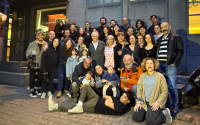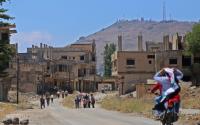23 May 2006The Independent
India's vultures, which are on the brink of extinction, could be saved at the last minute after the Indian government ordered a ban on the use of a drug that has been poisoning them.
The image of vultures slowly wheeling over the "towers of silence", where India's Parsees expose their dead, was one of the most iconic in the television series, The Jewel in the Crown, but the vultures have become a rare sight over the past 15 years.
Their numbers are declining faster than those of the dodo, and conservationists have warned the three species of vulture in India, Pakistan and Nepal could be extinct within five years. Numbers of the three species - oriental white-backed, long-billed and slender-billed - have fallen 97 per cent since the early 1990s.
The reason is diclofenac, an anti-inflammatory drug used to treat cattle in south Asia. The drug is harmless to the cows and water buffalo it is administered to, but fatal to the vultures who routinely feed on the carcasses of dead cattle. It causes the birds to have kidney failure.
It is not just the future survival of the vultures that is at stake. The drastic drop in their numbers has had severe ramifications on society in south Asia, which has traditionally relied on the birds. Animal carcasses that would have been picked clean by the vultures have been left rotting in the open, causing a serious health hazard.
Numbers of wild dogs, which also feed on the carcasses, have more then doubled with their main competitor, the vultures, out of the way, increasing the risk of rabies and other diseases. And traditional tanners and craftsmen who worked with the skin and bones of cattle picked clean by the vultures have had their livelihoods affected.
The famous towers of silence have fallen into disuse. India's Parsees - Zoroastrians who fled persecution in Persia centuries ago - believe that burial, by land or water, or cremation pollute the elements of earth, water and fire, and so have traditionally left their dead to be picked clean by the vultures on towers of silence.
The problem is that there are not enough vultures left, and the Parsees have had to turn to new methods to dispose of their dead.
Conservationists including Britain's Royal Society for the Protection of Birds have been campaigning for a ban on diclofenac since it was discovered to be the cause of the decline in vulture numbers in 2004.
The Indian government has ordered a ban on the production and sale of the drug within three months. Pharmaceutical companies have been told to concentrate instead on meloxicam, a drug that has been shown to be safe for vultures.
Dr Mark Avery, the director of conservation at the RSPB, said: "Saving Asian vultures is now more than possible because of this ban. The Indian government's decision is a historic and priceless one."
India's vultures, which are on the brink of extinction, could be saved at the last minute after the Indian government ordered a ban on the use of a drug that has been poisoning them.
The image of vultures slowly wheeling over the "towers of silence", where India's Parsees expose their dead, was one of the most iconic in the television series, The Jewel in the Crown, but the vultures have become a rare sight over the past 15 years.
Their numbers are declining faster than those of the dodo, and conservationists have warned the three species of vulture in India, Pakistan and Nepal could be extinct within five years. Numbers of the three species - oriental white-backed, long-billed and slender-billed - have fallen 97 per cent since the early 1990s.
The reason is diclofenac, an anti-inflammatory drug used to treat cattle in south Asia. The drug is harmless to the cows and water buffalo it is administered to, but fatal to the vultures who routinely feed on the carcasses of dead cattle. It causes the birds to have kidney failure.
It is not just the future survival of the vultures that is at stake. The drastic drop in their numbers has had severe ramifications on society in south Asia, which has traditionally relied on the birds. Animal carcasses that would have been picked clean by the vultures have been left rotting in the open, causing a serious health hazard.
Numbers of wild dogs, which also feed on the carcasses, have more then doubled with their main competitor, the vultures, out of the way, increasing the risk of rabies and other diseases. And traditional tanners and craftsmen who worked with the skin and bones of cattle picked clean by the vultures have had their livelihoods affected.
The famous towers of silence have fallen into disuse. India's Parsees - Zoroastrians who fled persecution in Persia centuries ago - believe that burial, by land or water, or cremation pollute the elements of earth, water and fire, and so have traditionally left their dead to be picked clean by the vultures on towers of silence.
The problem is that there are not enough vultures left, and the Parsees have had to turn to new methods to dispose of their dead.
Conservationists including Britain's Royal Society for the Protection of Birds have been campaigning for a ban on diclofenac since it was discovered to be the cause of the decline in vulture numbers in 2004.
The Indian government has ordered a ban on the production and sale of the drug within three months. Pharmaceutical companies have been told to concentrate instead on meloxicam, a drug that has been shown to be safe for vultures.
Dr Mark Avery, the director of conservation at the RSPB, said: "Saving Asian vultures is now more than possible because of this ban. The Indian government's decision is a historic and priceless one."






